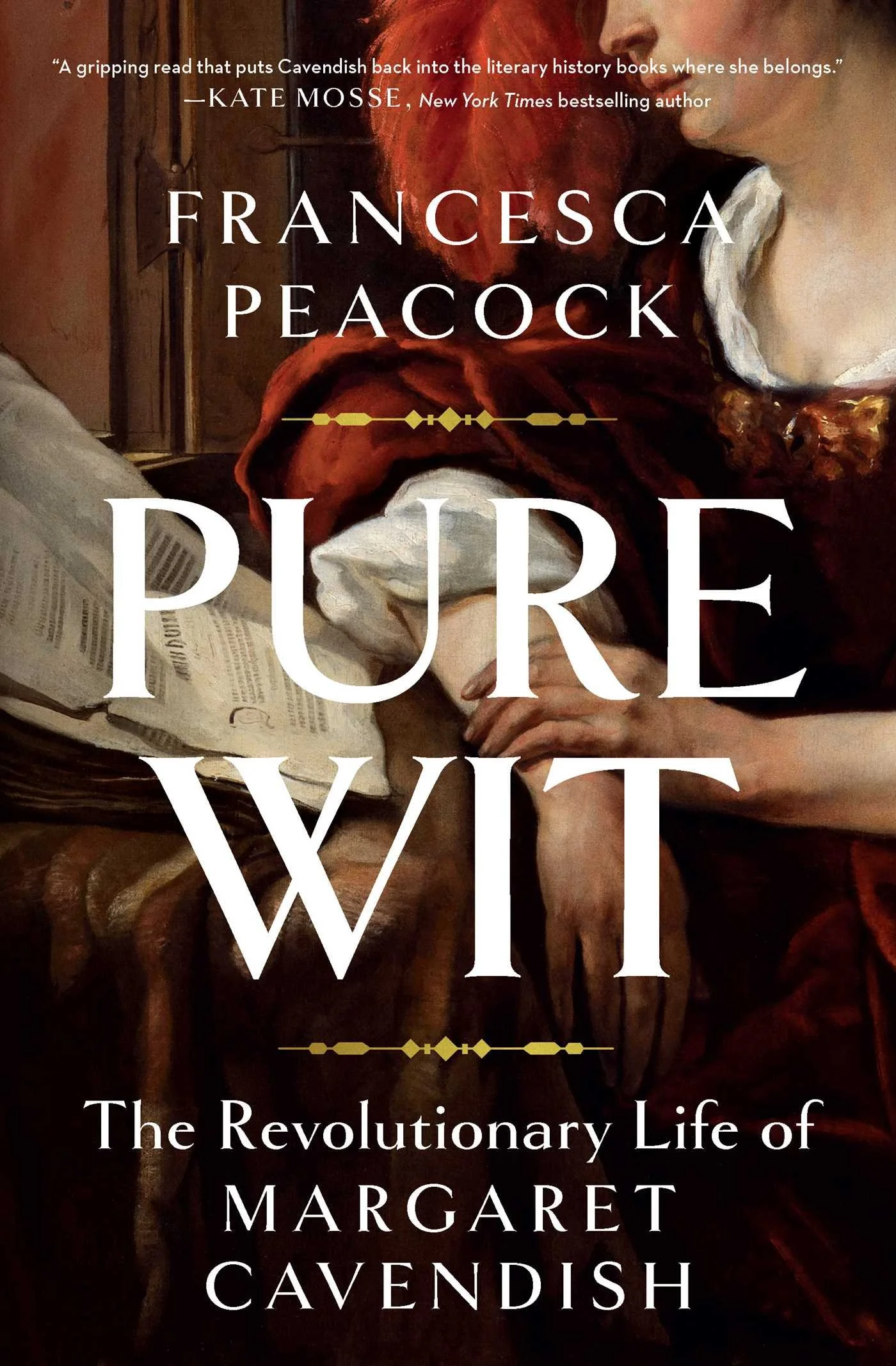Pure Wit by Francesca Peacock
/Pure Wit: The Revolutionary Life of Margaret Cavendish
By Francesca Peacock
Pegasus Books 2024
It’s always a little cause for celebration whenever a new book throws the spotlight on Margaret Cavendish, the great Restoration Duchess of Newcastle-upon-Tyne and author of, among many other things, the bizarre and wonderful proto-science fiction work The Blazing World. Readers embraced Margaret Cavendish most recently in Danielle Dutton’s 2016 novel Margaret the First, and now there’s a new biography, Francesca Peacock’s debut, Pure Wit: The Revolutionary Life of Margaret Cavendish, which is as full-throated a defense of the Duchess and her many works as she herself could have hoped to receive in her own day or any other.
She was born Margaret Lucas in 1623 to a wealthy family, and when civil war broke out in 1642, she went into exile as a handmaiden to Queen Henrietta Maria. In 1645, she married William Cavendish, and upon the Restoration in 1660, they both returned to England and began to reclaim Cavendish’s lands and incomes (although it took a while). The two of them retired to spend most of their time at their estate in Nottinghamshire, where Margaret continued to do the writing and publishing she’d embarked on years before.
That writing sprawled over a great many of the genres of her day, and they almost immediately started making their author notorious, with many writers in London and elsewhere accusing that Cavendish was inane, uninformed, out of her depth, ridiculous.
This controversy, which Cavendish so ardently courted and so ardently denied she was courting, has been the inescapable companion to every subsequent consideration of this figure as both a person and an author from her own day to the present. The whiff of dabbling, combined with her intentionally-cultivated penumbra of personal eccentricities, laid her open to all the expected raillery and bigoted dismissal. She became “Mad Madge,” a figure whose precedence was undeniable but whose presence could be mocked or slighted. Virginia Woolf’s great essay about her epitomizes the most generous kinds of reactions Margaret Cavendish has tended to elicit.
The present historical moment of the 21st century naturally raises worries that any new Margaret Cavendish biography will do the #MeToo Shuffle: “Margaret Cavendish was criticized not for her writing but really because she was a woman; the men of her day hated the fact that a woman was writing in their midst; men in our own day hate women; men are bad; menbadmenbadmenbadmenbadmenbad.” And Francesca Peacock doesn’t calm those worries when, in her Author’s Note, she mentions that she’ll occasionally reproduce Margaret Cavendish’s original unconventional spelling “in the spirit of protecting women’s rights to spell as they wish.” A heavy sigh wouldn’t even start to address the stupidity of this kind of comment.
Fortunately, Pure Wit recovers quickly from its author’s proud defense of misspelling. She fills her 300 pages with, yes, spirited defenses of Margaret Cavendish but also thoughtful and sometimes insightful discussions of her many works and the events of her times. For Peacock, Cavendish is “a virtuoso; a radical; and one of those historical figures who seem to be spectacularly out of joint with the century into which they were born.”
There are extended readings of every major work and a good deal of commentary (“‘Tis harder,” Cavendish about Shakespeare, but it’s also quite telling on her own case, “and requires more wit to express nonsense than sense, and ordinary conversations, than that which is unusual and ‘tis harder, and requires more wit to express a jester, than a grave statesman …”), and there are plenty of well-done historical set pieces about the various stages of Margaret’s life. As a biography, much less a debut biography, it’s credible and very engaging.
And thankfully, it saves its predictable 21st century hyper-partisanship for the final few pages, after the banquet has been rightfully savored. That hyper-partisanship is ridiculous, but placed as it is, it’s almost charming:
Her works are still attacked for being contradictory and confusing (nobody ever says the same about Alexander Pope’s The Dunciad); too anti-feminist for her supposed feminist credentials (does this stop anyone reading Mary Wollstonecraft?); and too rooted in a scientific and philosophical context different to our own to be relevant (it is hard to find someone who would argue this about Thomas Hobbes, or John Locke).
Nobody ever says The Dunciad is contradictory and confusing because it isn’t, whereas many of Cavendish’s works are. The fact that she’s too anti-feminist for her supposed feminist credentials never stops people from reading Mary Wollstonecraft because she wasn’t. You can’t find anybody to argue that the science or philosophy of Hobbes or Locke makes them irrelevant because such people don’t exist, because the argument is absurd. And even more absurd is the implication underlying all these contrasts: that Margaret Cavendish is every bit as good as Pope or Wollstonecraft or Hobbes or Locke. She isn’t. A biographer who wants Margaret Cavendish to have her due as a wit, a prose stylist, and a trailblazer is doing a good service to readers. A biographer who responds to Margaret Cavendish’s comparative lack of renown by claiming she’s the greatest writer who ever lived is not only misserving those readers but also engaging in at least the same bandwidth (if not the same conclusion) as the condescension that dogged the Duchess in her own day.
The solution in this case couldn’t be simpler: when readers reach the book’s last chapter, “Doubt of an after being,” they can just skip it. Or take a generous gulp of wine and forge ahead with a light heart.
Steve Donoghue is a founding editor of Open Letters Monthly. His book criticism has appeared in The Washington Post, The American Conservative, The Spectator, The Wall Street Journal, The National, and the Daily Star. He has written regularly for The Boston Globe, the Vineyard Gazette, and the Christian Science Monitor and is the Books editor of Georgia’s Big Canoe News
